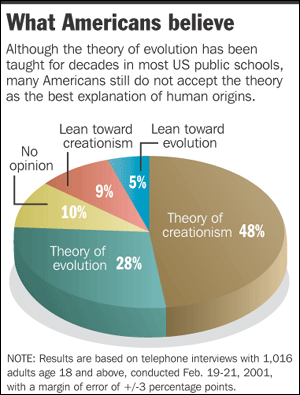Macfistowannabe said:
I don't see how "changes in the environment" are enough to turn monkeys into humans. Why aren't monkeys still turning human? Is time a magic wand?
First off, "isolation" (hence, inbreeding) is a necessary requirement for evolution. This is generally why isolated islands (like the Galapagos Islands) are fertile grounds for evidence of evolution.
Secondly, "monkeys" is a generic term. Humans would have come from specific species of "monkey" that is now extinct. Lumping chimpanzees, apes, and gorillas all into the same category is wrong; they are not seen as even being the same species.
Third, we see evidence of evolution every day. "Drug resistant" bacteria and viruses are examples of evolution.
Fourth, those quotes are complete crap. The "Colin Patterson" quote is creationist propaganda, and this site...
http://www.talkorigins.org/faqs/patterson.html
...explains it further.
As for "Professor Louis Bounoure," the French National Center for Research had this to say:
"As far as we know, Louis Bounoure never served as "Director" (nor was even a member) of the CNRS. He was a professor of biology at the University of Strasbourg. Bounoure was a Christian but did not affirm that Genesis was to be taken to the letter. He expressed his ideas in his work. He is clearly "finalist" and against all contingent visions of evolution. ["Finalism" is a philosophical term related to a belief in ultimate purpose or design behind everything, including, in this case, the evolution of the cosmos and of life. - ED.] He bases his views, among other things, on the existence of elements that are pre-adapted for their future functions."
In other words, Bounoure is not a creationist, as much as a "finalist."
As for creationism vs. evolution, creationism is completely founded upon mythic speech and pseudoscience. But, because of its "mythic" nature, you can't disprove it. If I was convinced of an invisible leprechaun being under my bed and you told me it wasn't there, I could just say that only true believers can see it.
Calling evolution as "merely a theory, not a fact" exploits inherent scientific uncertainty to the point of ridiculousness. It's a theory with lots of evidence, while, meanwhile, there is little to no evidence for half the stuff involved in creationism. Creationism is not a fact; it's just "a theory." And a disproven one at that.
I think this National Geographic article, though, explains a lot of what I think about the issue...
http://news.nationalgeographic.com/news/2004/10/1018_041018_science_religion.html
...which essentially says what I said earlier: science and religion aren't necessarily incompatible.
Melon







 ok a few. Arrrrrrrrrrrgh LOL!
ok a few. Arrrrrrrrrrrgh LOL!